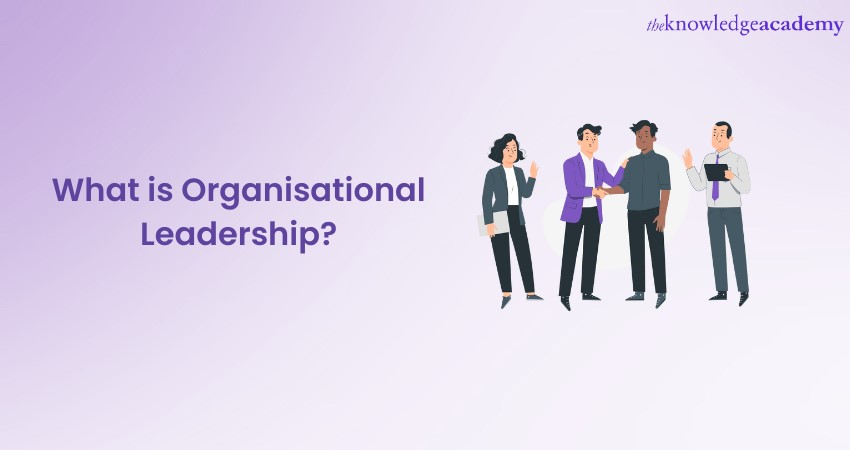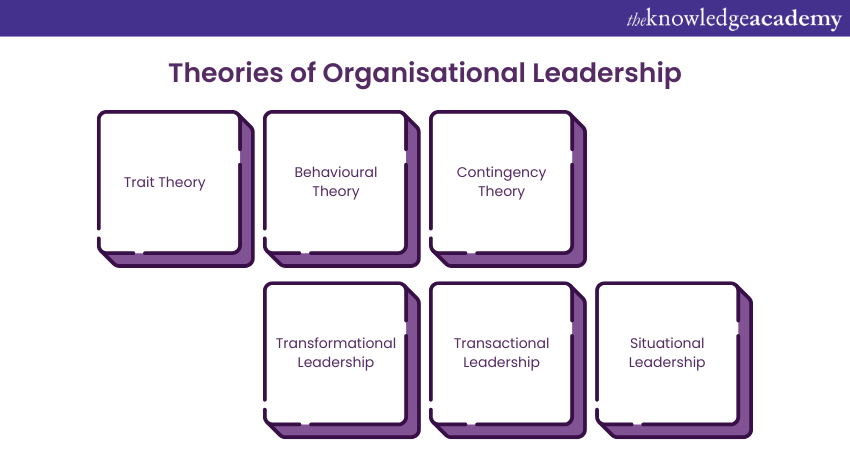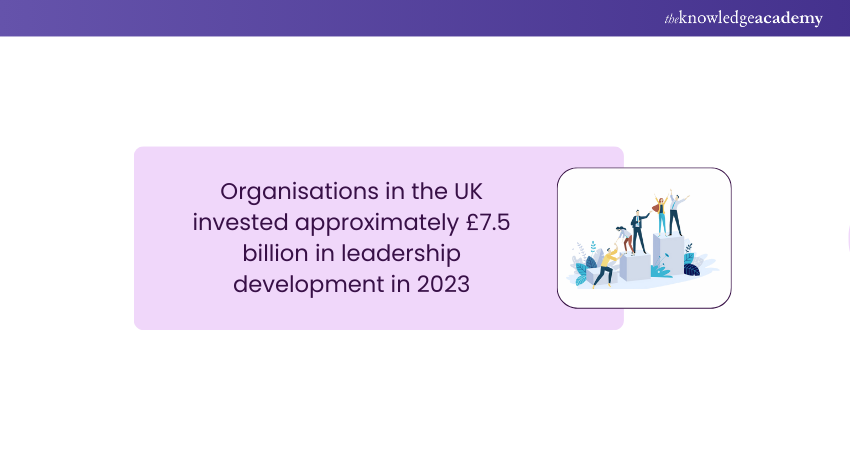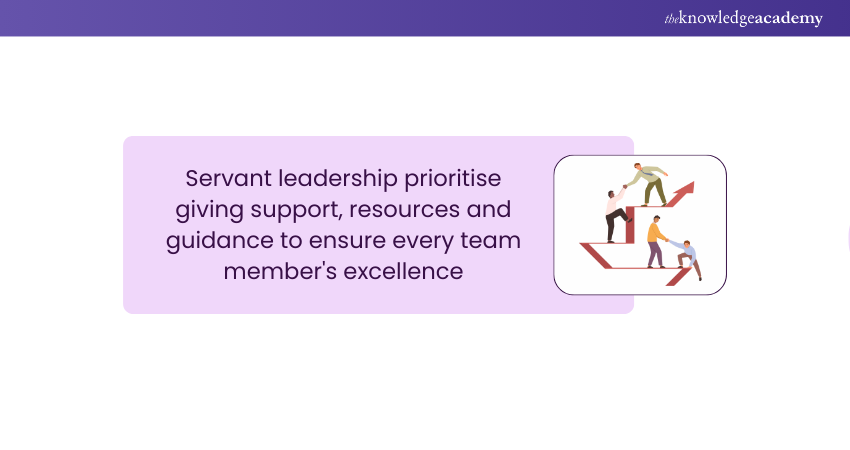We may not have the course you’re looking for. If you enquire or give us a call on + 1-866 272 8822 and speak to our training experts, we may still be able to help with your training requirements.
Training Outcomes Within Your Budget!
We ensure quality, budget-alignment, and timely delivery by our expert instructors.

Organisational leadership is more than just about guiding teams to reach company goals - It's about inspiring greatness among individuals and teams alike. It's the power that aligns vision with action, turns challenges into exciting opportunities, and creates a culture of camaraderie and creativity.
If you aspire to take on this inspiring role, then consider this blog your ideal gateway into understanding What is Organisational Leadership. Read on and learn how great leaders not only steer the ship, but also set the course and ignite the crew's passion for innovation in the turbulent corporate world!
Table of Contents
1) What is Organisational Leadership?
2) Theories of Organisational Leadership
3) Why Is Effective Organisational Leadership Important?
4) Key components of effective Organisational Leadership
5) Organisational Leadership skills
6) Types of Organisational Leadership
7) What Do Organisational Leaders Do?
8) Examples of Organisational Leadership
9) Conclusion
What is Organisational Leadership?
Leadership involves the capacity to implement change by formulating and conveying a vision to others. Organisational leadership encompasses the qualities and skills necessary for managing a company or one of its divisions. It extends in scale and scope beyond many other leadership forms.
While leadership does not inherently demand business expertise, it proves beneficial for Organisational Leaders to possess it. This enables them to steer their organisations, foster innovation, and navigate organisational change. Hope you got a glimpse of What is Organisational Leadership through this blog!
Theories of Organisational Leadership
Organisational Leadership is a rich field that has given rise to several theories, each offering distinct perspectives on what makes a Leader effective and how leadership functions within an organisational context. Here’s a list of the popular theories:

Trait Theory
The trait theory states that certain inherent traits or qualities distinguish great leaders from the rest. These traits include:
a) Charisma
b) Confidence
c) Adaptability
d) Communication Skills
While this theory acknowledges the role of genetics in shaping leadership abilities, it also recognises that education, experiences, and personal growth can drive the development of these traits.
Behavioral Theory
In contrast to the trait theory, the behavioural approach focuses on leaders' actions and behaviours rather than their innate traits. Effective leadership can be learned and cultivated through observation, practice, and feedback.
This theory stresses the importance of adopting behaviours promoting clear communication, collaboration, and ethical decision-making.
Contingency Theory
The contingency theory asserts the following vital points:
a) There is no one-size-fits-all approach to leadership.
b) Different situations necessitate different leadership strategies.
c) Leaders who adapt their approach based on their team's context and needs are more likely to succeed.
Want to build and nurture a high performing team? Our High Performing Teams Training will help you - Sign up now!
Why Is Effective Organisational Leadership Important?
Leadership is vital in business, and Organisational Leaders assume an additional role because they often set the tone for the direction their companies, and sometimes even their industries, will take. Here are the biggest reasons why effective Organisational Leadership is important:
Motivates Team Members
Leaders play a critical role in employee engagement and motivation, and motivated employees can lead to higher productivity. Leaders focus on improving team morale and their companies. Those at higher levels face improving employees’ motivation without direct lines of contact.
You can improve employee morale by:
a) Hiring effective leaders for management positions.
b) Creating a positive company culture
c) Structuring organisational systems, values and processes effectively
d) Being open to a broad range of feedback
Driving Performance and Growth
Organisational leadership is instrumental in driving performance and fostering growth within an organisation by:
a) Setting strategic objectives
b) Aligning teams with those goals
c) Provides clarity, direction, and support to enhance individual and collective performance
Additionally, leaders are responsible for making critical decisions that can result in innovation, market expansion, and enhanced profitability. Their ability to effectively adapt to changing market conditions is essential for the organisation's sustainable growth.
Fosters Open Communication
Communication skills are essential for leaders. Poor workplace communication can lead to many problems, including project delays, stress, and decreased morale. Organisational Leadership offers various ways to encourage open communication in your company, including:
a) Providing information about what's going on in a manner that encourages and enables employees to act.
b) Explaining your organisation's trajectory in a logical manner that appeals to employees’ emotions.
c) Ensuring employees are aware of how their everyday tasks drive your organisation's overarching mission.
d) Achieving tasks with individual employees and groups, both virtually and in-person.

Key Components of Effective Organisational Leadership
Successful Organisational Leadership requires a multifaceted skill set beyond just giving orders. Let's explore the key components that constitute effective Organisational Leadership:
Vision and Strategy
A Visionary Leader possesses a clear, compelling vision for the organisation's future. This vision is a guiding star, inspiring team members to rally around common goals. Alongside the vision, a well-defined strategy outlines the steps needed to achieve that vision. A leader's ability to communicate these aspects, ensuring alignment and enthusiasm across the team, is crucial.
Communication Skills
Effective communication is the heart of Organisational Leadership. Leaders must be skilled at articulating their vision, providing clear instructions, and fostering an environment where open dialogue is encouraged. Transparent communication builds trust, minimises misunderstandings, and ensures that each team member establishes their role in achieving the organisation's objectives.
Decision-making Abilities
Leaders often confront complex decisions that impact the organisation's trajectory. Influential Leaders are skilled at gathering relevant information, analysing alternatives, and making informed choices that align with the organisation's goals. They strike a balance between decisiveness and considering input from their team.
Emotional Intelligence
Emotional intelligence is about understanding and empathising with one's emotions. High emotional intelligence is a desirable skill among leaders as it helps them manage stress, navigate conflicts, and build meaningful relationships. It results in positive work environment and encourages mutual respect and collaboration among team members.
Team Building and Motivation
Successful leaders recognise that their team is the backbone of the organisation. They invest time in building cohesive, high-performing teams by fostering a sense of unity. Moreover, they encourage diverse perspectives, and recognise individual contributions. Motivating employees through constructive feedback and growth opportunities helps boost morale and productivity.
Why is Organisational Leadership Important?
The importance of effective Organisational Leadership cannot be overstated, as it holds an organisation's mission, vision, and values together. A capable leader shapes organisational culture, setting the tone for collaboration, innovation, and ethical conduct. Through their guidance, leaders cultivate an environment where individuals feel empowered and motivated to deliver their best efforts.
Understand the barriers to effective communication in an organisation, sign up for our Leadership and Management Training now!
Organisational Leadership Skills
The journey towards becoming a becoming a proficient Organisational Leader is filled with continuous growth and self-improvement. Now that you have a basic understanding of What is Organisational Leadership, let’s explore the skills needed to become an Organisational Leader. The following are the various avenues for individuals to develop and expand their Organisational Leadership Skills:
Training and Development Programs
Many organisations provide training and development programs specifically designed to nurture leadership skills. These programs cover various topics such as communication, conflict resolution, decision-making, and Emotional Intelligence. Engaging with these programs equips aspiring Leaders with practical tools and strategies to apply in real-world situations.
Mentorship and Coaching
Experienced leaders can play a pivotal role in guiding emerging leaders. Mentorship provides a platform for sharing insights, offering guidance, and discussing challenges. Through regular interactions, mentees gain valuable perspectives and learn from the experiences of their mentors. Conversely, coaching involves giving personalised advice to help leaders identify strengths and areas for improvement.
Continuous Learning
Leadership is a dynamic field that evolves with the changing business landscape. Engaging in continuous learning through workshops, seminars, webinars, and reading materials keeps leaders updated on the latest trends and best practices. Leaders can remain effective in a rapidly changing environment by staying informed and adapting their approaches.
A Deep Understanding of Business
An in-depth understanding of their business is essential for Organisational Leaders which includes:
a) Internal functions and dynamics
b) Context within the market
c) Influences of external factors
Understanding market trends aids in creating short-term and long-term organisational plans. These factors allow Organisational Leaders to nurture a comprehensive vision for their team and motivate members to persevere amidst various challenges.
Interpersonal and Communication Skills
Since Organisational Leadership is people-focused, strong interpersonal and communication skills are vital in leading a group to accomplish shared goals. The elements of these skills include:
a) Active listening
b) Adaptive communication
c) Leading with curiosity
d) Open body language
Accepting feedback as a manager fosters trust and respect among your team.
Self-awareness
Self-awareness results in more transparent communication and confidence and builds stronger workplace relationships. Improving as a leader includes identifying strengths and areas of improvement and applying feedback effectively.
Maintaining a growth mindset maximises leadership skills. Seeing challenges, feedback and criticism as growth opportunities strengthens the organisational framework.
What Do Organisational Leaders Do?
Organisational leaders play a multifaceted role in steering their companies or institutions toward success by setting a compelling vision, defining strategic objectives and providing clear direction for their teams. They are responsible for making critical decisions, allocating resources efficiently and ensuring the organisation’s goals are met.
Influential leaders adapt to changing circumstances, navigate challenges, and inspire organisational resilience. Ultimately, Organisational Leaders shape the culture and guide their entities toward long-term prosperity.

Types of Organisational Leadership
Organisational Leaders employ a variety of leadership styles, each characterised by unique approaches to decision-making, communication, and team interaction. Let's dive into some of the prominent leadership types and their implications:

Autocratic Leadership
Autocratic Leaders make decisions unilaterally without seeking input from their team members. This style is often effective in situations requiring quick and decisive actions, such as emergencies. However, it can stifle creativity and discourage team members from taking initiative. Autocratic Leadership is best used sparingly, especially when a Leader's expertise is critical.
Democratic Leadership
The decision-making process of Democratic Leaders involves the participation of team members. This style builds a sense of ownership and inclusivity, as team members feel valued and heard. By tapping into the team's collective wisdom, Democratic Leaders often arrive at well-rounded decisions. However, this approach can be time-consuming, and not all decisions warrant consensus-building.
Laissez-Faire Leadership
Laissez-Faire Leaders adopt a hands-off approach, giving team members considerable autonomy in their work. This style can be impactful when working with experienced, self-motivated professionals who require minimal supervision. However, in environments with less experienced team members, it might lead to confusion and lack of direction.
Servant Leadership

Servant Leaders prioritise the development and well-being of their team members. They focus on providing the necessary support, resources, and guidance to help team members excel. This approach nurtures a culture of collaboration and trust, as leaders genuinely care about the growth and success of their team. Servant Leaders often create a positive work environment that promotes creativity and innovation.
Charismatic Leadership
Charismatic Leaders inspire and influence others through their compelling personalities and charm. They have a strong ability to communicate their vision and rally others behind it. While Charismatic Leaders can be highly motivating, there is a risk of over-dependence on the Leader's presence. Organisations need to build resilience beyond the charisma of a single individual.
Examples of Organisational Leadership
Here are three famous examples of Organisational Leadership that transformed not only the respective companies but the industries as a whole:
1) Steve Jobs (Apple): Steve Jobs' visionary leadership transformed Apple Inc. into a global tech giant. His focus on design excellence, innovation, and user-centric products like the MacBook and iPhone set a benchmark for creativity and leadership.
2) Indra Nooyi (PepsiCo): As CEO of PepsiCo, Indra Nooyi led the company through tremendous growth and diversification. Her strategic focus on sustainable practices and healthier products enabled PepsiCo to stay competitive while aligning with ever-changing consumer preferences.
3) Satya Nadella (Microsoft): Satya Nadella's inspiring leadership revitalised the Microsoft. His emphasis on open-source technologies and cloud computing has transformed Microsoft into a leader in the cloud industry, with a significant rise in market value and innovation.
Conclusion
Gaining continual insight into What is Organisational Leadership is essential for aspiring and seasoned leaders as there's always more room for learning. Organisational Leadership involves diverse theories, styles, and skills weaving together a dynamic and practical framework. By embracing the essence of leadership, honing crucial competencies, and adapting to evolving challenges, you can steer your organisation toward success, fostering growth, innovation, and lasting impact.
Learn different types of principles, models, and steps for effective decision-making, sign up for our Decision Making Skills Training now!
Frequently Asked Questions

Organisational leadership's impact on team performance and productivity is profound. Effective leadership fosters a culture of trust, clear communication, and motivation, aligning team goals with organisational objectives.

Organisational leadership significantly influences career growth and advancement opportunities. Strong leadership provides mentorship, guidance, and opportunities for skill development, enabling individuals to expand their capabilities and expertise.

The Knowledge Academy takes global learning to new heights, offering over 30,000 online courses across 490+ locations in 220 countries. This expansive reach ensures accessibility and convenience for learners worldwide.
Alongside our diverse Online Course Catalogue, encompassing 17 major categories, we go the extra mile by providing a plethora of free educational Online Resources like News updates, blogs, videos, webinars, and interview questions. Tailoring learning experiences further, professionals can maximise value with customisable Course Bundles of TKA.

The Knowledge Academy’s Knowledge Pass, a prepaid voucher, adds another layer of flexibility, allowing course bookings over a 12-month period. Join us on a journey where education knows no bounds.

The Knowledge Academy offers various Leadership Courses, including Introduction to Supervising a Team, Agile Leadership Training, Decision Making Course and more. These courses cater to different skill levels, providing comprehensive insights into How to Become a Supervisor.
Our Business Skills Blogs cover a range of topics related to Organisational leadership, offering valuable resources, best practices, and industry insights. Whether you are a beginner or looking to advance your Business Skills, The Knowledge Academy's diverse courses and informative blogs have you covered.
Upcoming Business Skills Resources Batches & Dates
Date
 Successful People Management and Team Leadership
Successful People Management and Team Leadership
Fri 6th Dec 2024
Fri 10th Jan 2025
Fri 14th Feb 2025
Fri 11th Apr 2025
Fri 23rd May 2025
Fri 8th Aug 2025
Fri 26th Sep 2025
Fri 21st Nov 2025







 Top Rated Course
Top Rated Course



 If you wish to make any changes to your course, please
If you wish to make any changes to your course, please


